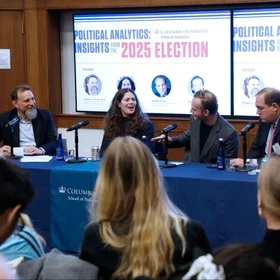By Christoph Meinrenken, Program Director, Information & Knowledge Strategy (IKNS)
Recently one of our students asked me, “I noticed that you joined IKNS only last year, while still teaching other courses at Columbia and doing research with the Data Science Institute and the Climate School. Why IKNS?” I wanted to tell them that I have always loved science and academia—and therefore books—and that IKNS is the only degree at Columbia that has historical roots all the way back to the founding of Columbia’s Library School in 1887.
Those historical roots are indeed one of the many things I like about IKNS, but I didn’t want the student to think I was a Luddite. So, I opted for the more obvious reason: “Well, I have an undergraduate degree in math and did my Ph.D. in neuroscience, and that is no coincidence. I have always had a passion for numbers and data, but I also have deep respect for how humans process that information and ultimately behave and interact with each other.”
“Yes,” said the student. “From my IKNS courses, I am beginning to understand more and more the value of mastering both technical skills and people skills. The IQ and EQ as some of my professors like to call it. But how does this play out in your research?”
As an example, I explained that we had recently tracked how COVID-19 affected people’s daily rhythms of life and work by analyzing electricity consumption in hundreds of apartments around Columbia’s campus. The COVID-19-specific “signal” in the data could only be isolated after we had accounted for other trends brought about by behavioral interventions aimed at efficiency improvements (read more on that here).
Still, what I value even more in IKNS is that we not only cover IQ and EQ in our teaching and research, but our students also take the multidisciplinary approach from IKNS to become more impactful in the organizations they join once they graduate.
Look no further than IKNS alum Joel Ruffin Sr., who heads up cybersecurity at Goldman Sachs. In his recent seminar at Columbia’s Faculty House he not only described the data and IT system challenges that cyber threats bring but also how he envisions successful cybersecurity as mimicking the multifaceted strategy of human immune systems. This means leveraging IT management, in addition to human resources, knowledge management, and conflict resolution to safeguard strategic assets and achieve competitive advantages from today’s cyber threats (more on the event here).
This complex interplay of IQ and EQ is foundational to IKNS and is something we instill in our instruction. Ultimately, the way that humans process and apply knowledge influences outcomes—and having the skills to stay on top of this complex interplay means maximizing our professional impact.
Learn more about the M.S. in Information and Knowledge Strategy program.



